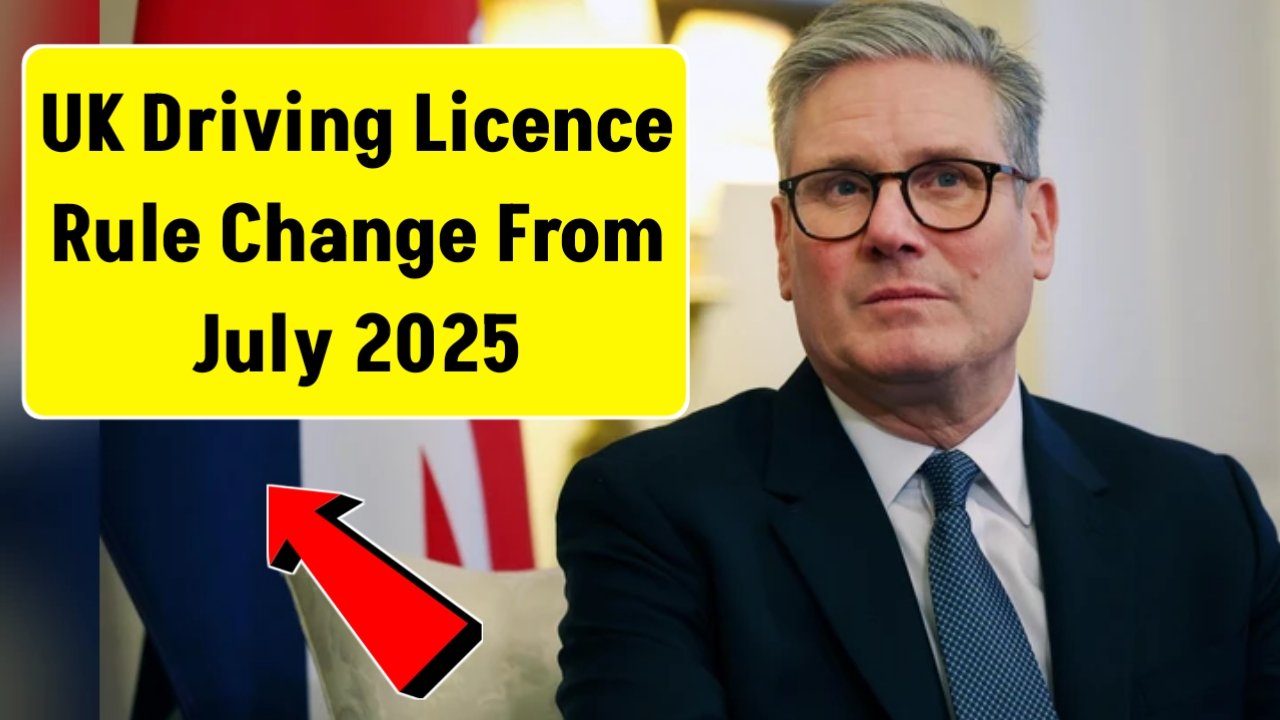UK Driving Licence Rule Change From August 2025 : The UK government has recently introduced significant updates to driving licence rules that will come into effect from August 2025, specifically targeting drivers aged 70 and above. If you’re part of this age group or have elderly family members who still drive, these new regulations could directly impact your ability to stay on the road. Understanding these changes now can help you stay compliant and avoid unnecessary penalties or restrictions. Here’s everything you need to know, from medical checks to renewal process updates and what the DVLA expects from older motorists in the coming months.
Licence Renewal Rules Tightened
From August 2025, drivers aged 70 and above must renew their driving licence every three years instead of the previous ten-year cycle. The renewal process has been made more stringent to ensure that only those fit to drive continue to do so. The DVLA will require more detailed medical declarations and may even ask for evidence from a GP, depending on health conditions.
Online and Paper Renewal Options
The DVLA will continue to offer both online and paper renewal methods, but elderly drivers are strongly encouraged to use the digital platform for faster processing. However, for those uncomfortable with technology, paper-based applications will remain available through the post. The forms will be updated to reflect new medical and identity verification sections that all applicants must complete.
Stricter Medical Declarations
One of the biggest changes is the revised medical declaration requirements. From August 2025 onwards, drivers must provide updated information regarding eyesight, mobility, and neurological conditions. Failing to disclose relevant medical information could lead to the cancellation of the licence. In some cases, a medical assessment from a doctor or optician may be mandatory before renewal is approved.
Vision Standards To Be Rechecked
To continue driving, elderly motorists must meet the updated minimum eyesight standards. The DVLA has introduced clearer guidelines on what qualifies as acceptable vision. All drivers over 70 must confirm they can read a car number plate from 20 metres away, either with or without corrective lenses. If there’s any doubt, a visit to an optician will be necessary before applying for a new licence.
Possible Driving Tests For Some Cases
Though not mandatory for all, drivers with medical or cognitive concerns may be required to take a short driving assessment. These are not pass-or-fail style tests but are designed to evaluate road awareness, reaction time, and safe driving habits. The DVLA will use the results to determine whether a full licence should be granted, a restricted one issued, or revoked entirely.
Digital Reminders & Notifications
To help with timely renewals, the DVLA has launched a new notification service via email and text, reminding elderly drivers when their licence is about to expire. This service will be optional but is recommended, especially for those who may forget key dates. Missing a renewal deadline could result in a temporary loss of driving rights until the new licence is processed.
Impact On Motor Insurance
Insurance providers across the UK have welcomed the stricter rules, stating it would likely improve road safety among senior drivers. However, they also warn that failure to comply with the new licensing requirements could void a policy. It’s essential to update your insurer once a new licence is issued, especially if it includes any changes or restrictions.
New Rules For Driving Abroad
For those planning to drive in the EU or abroad, the new licensing rules may affect international driving permissions. Some countries may require proof of a current, unrestricted UK licence, and elderly drivers with medical notes or restricted permits may face limitations. It’s advisable to check the foreign country’s driving rules before travelling.
Penalties For Non-Compliance
If a driver over 70 continues to drive with an expired or invalid licence after August 2025, they could face fines up to £1,000, receive points on their driving record, or even be prosecuted. The DVLA is working with police and insurance databases to track compliance more efficiently, meaning that non-compliance may not go unnoticed for long.
Public Transport Alternatives Encouraged
The government is also promoting alternative transport for elderly individuals who may no longer feel confident driving. Discounted bus passes, railcards, and community transport options are being expanded to ensure mobility for those who voluntarily surrender their licence or do not meet the renewal criteria.
Conclusion
The August 2025 changes to the UK driving licence system represent a shift towards greater accountability and road safety, particularly for drivers aged 70 and above. While these new rules may seem demanding, they aim to protect not just elderly drivers but everyone on the road. If you’re turning 70 soon or already past that age, it’s important to review your health status, ensure your vision meets the required standards, and prepare for a more detailed licence renewal process. Taking timely action can help you retain your independence and continue driving safely under the updated regulations.
FAQs
Will I lose my licence when I turn 70?
No, but you must renew it, and this will need to be done every three years instead of once a decade.
Do I need a medical test every time I renew?
Not always, but if you have certain health conditions, the DVLA may request one.
What if I fail the eyesight requirement?
You may be asked to get new glasses or contacts. If you still don’t meet the standard, your licence may not be renewed.
Can I renew my licence online?
Yes, and it’s recommended for faster processing. However, postal renewals will still be accepted.
Is there any cost involved in renewing my licence?
Generally, licence renewal after 70 is free, but medical tests or optician visits may cost extra.

